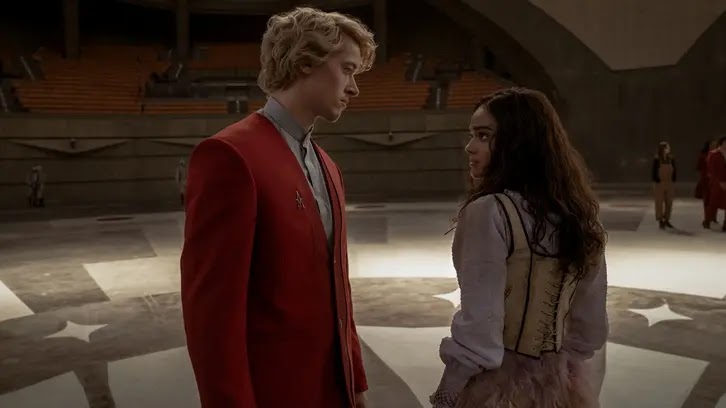Ballad of Songbird and Snakes feels like it’s arrived five years too late after the young adult genre has died a slow death on film, yet Francis Lawrence’s Hunger Games prequel is acutely aware of the fact that The Hunger Games is no longer the cultural phenomena that it was in the 2010s, framing this 60+ year prequel as an origin story for President Snow, based around Suzanne Collins’ novel, the only book in the series I haven’t quite gotten around to reading yet. The Games are in their infancy and the public’s interest is waning: they don’t like watching children die on screens and why would they? A shakeup is planned for this year: those from District 1, the richest – must mentor those from the poorer districts before they enter the arena in a bid to become more presentable to the audience. A young Snow, ambitious but still with a heart and plenty of rebellious friends, gets charming, free-spirited and rebellious singer Lucy Gray – and history follows in its wake.
The inner workings of the game’s absurdity is something that Ballad of Songbird and Snakes is aware of as it addressees the origin of the games themselves whilst taking place a few years after they’ve begun. The arena isn’t quite as fleshed out as when we meet Katniss Everdeen, it’s rugged and feels like a warzone. The tributes are raw and given the thinnest of characterisations but you don’t have to have enough to realise that it's hard to watch these children fight each other: the attention is all on Rachel Zegler’s Lucy Gray from the word go, who makes a fiery entrance singing to a crowd.
Those of you who’ve seen Spielberg’s West Side Story (and if you haven’t, you should), will know of Zegler’s brilliance – and she’s more than capable of putting in a multifaceted performance to rival Tom Blyth’s Coriolanus Snow; who undergoes a villainous origin story that’s met with some sympathy for his actions but ultimately transforms him into the cold-hearted monster that he will become – think Anakin Skywalker-type tragedy here; it’s quite surprising to see Francis Lawrence and by extent, Suzanne Collins, borrow so much from the Star Wars prequels in terms of depicting Anakin’s fall yet it’s a feat that’s worthy of Lawrence’s pedigree as a director: he is the most formulative of the crop of young adult franchise directors to come out of the 2010s and the most experienced, able to transform The Ballad of Songbird and Snakes that were it not for the strike meaning lack of promotion and awareness of the film, would make it feel like a real event: most people I spoke to, even fans of the books – at work – were convinced it was coming out in a few months, not realising it was already here.
Schemes and politicking are the order of the day: represented by Snow adopting a quasi Draco Malfoy guise before transforming into an Eminem-type soldier in the third act once his punishment is dealt. The film wisely avoids making the games the sole focus and gives the opportunity to explore more of the world of Panem; where we learn about the war a bit more and how the districts came to be. We get to learn more about the origin of the games: in fashion of their high-concept, they started out as a joke, designed by Highbottom, played in fine form by the always good Peter Dinklage – but kept with and run with by Snow’s dad, turned from a cruel joke into a ruthless killing machine.
The power dynamics at the heart of The Ballad of Songbird and Snakes are fascinating, and the film is all about the central theme of the corruption of power: the split between Lucy Gray and Snow feel like a bit rushed at times with as much of the brotherhood between Snow and Sejanus being deeply felt if not even moreso; and you see that reflected in their dynamics: Snow is at his safest when Lucy is in the arena, outside of that – he’s spiralling out of control. Juxtaposed that with Sejanus – poor, poor Sejanus – played brilliantly by Josh Andres Rivera, full of goodwill and hope and a moral compass. This feels like the more fleshed out dynamic of the two that Snow is paired with and their chemistry is just as good – if not better; Rivera giving everything he has as the doomed revolutionary.


